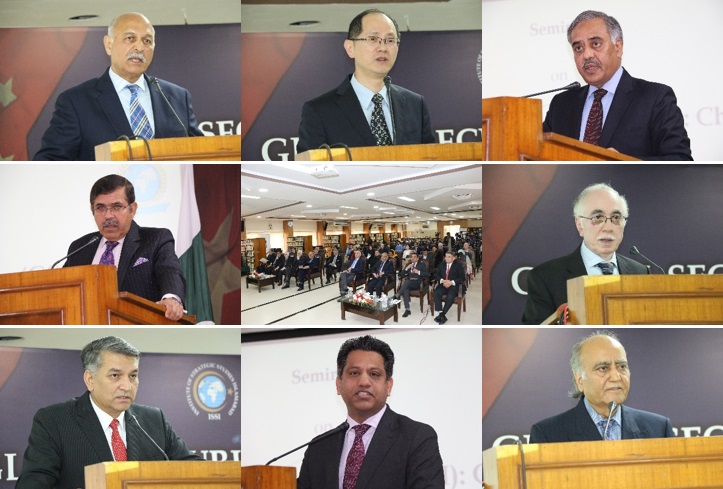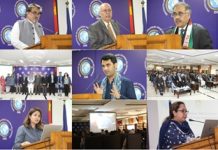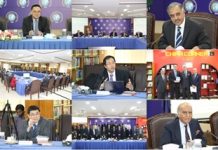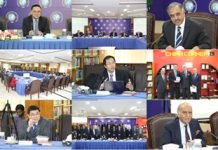Press Release
ISSI hosts Seminar on “Global Security Initiative (GSI): China’s World View”
March 5, 2024

The China Pakistan Study Centre (CPSC) at the Institute of Strategic Studies Islamabad (ISSI) hosted a seminar entitled “Global Security Initiative (GSI): China’s World View.” Senator Mushahid Hussain Sayed, Chairperson Senate’s Standing Committee on Defence, delivered the keynote address. Eminent speakers including diplomats and former and serving high ranking officials presented their perspectives. The seminar provided valuable insights into China’s vision for global security and development and how China wishes to engage with different countries and global organizations through this pivotal framework.
Senator Mushahid Hussain Sayed, during his keynote address, highlighted that the Global Security Initiative (GSI) is part of composite whole i.e., China’s vision of common destiny, based on the concept of indivisible security, UN Charter, international law and five principles of peaceful co-existence, which is in contrast with the cold war, zero-sum mindset. He highlighted that China’s world view is rooted in the strategic culture of China and contemporary security scenario. He stressed that GSI reflects the strategic thought of China, which is derived from various sources and aspects of China’s national experience including the Silk Road, the Great Wall of China, PLA’s Long March, and “the century of humiliation” that the country recovered from. He lauded Pakistan’s abiding friendship with China, citing steadfast support of both countries for each other’s issues of core interest. He highlighted that the future belongs to connectivity and regionalism, not the Cold War. He suggested that the rise of multipolarity necessitates multilateral approach to global security issues, including laudable initiatives like GSI.
In his welcome remarks, DG ISSI Ambassador Sohail Mahmood underscored the importance of China’s flagship Belt and Road Initiative (BRI) that has been a global, innovative and successful venture of China laying down a comprehensive framework for cooperation and development. He added that President Xi Jinping has since successively proposed three other major global initiatives, namely the Global Development Initiative (GDI), the Global Security Initiative (GSI), and the Global Civilisation Initiative (GCI).
Ambassador Sohail Mahmood highlighted how these initiatives not only indicate the depth of President Xi’s thinking and vision as part of his philosophy of building a “Community with a Shared Future for Mankind” but also illustrate China’s readiness to engage globally in three pivotal domains for humanity, that is, development, security, and civilization. In the backdrop of recent global and regional developments, Ambassador Sohail Mahmood noted that GDI, GSI and GCI are envisaged to serve as the building blocks for a world aspired to be peaceful, prosperous and harmonious. GSI embodies China’s commitment to global peace and development and reflects an entirely different paradigm – prioritizing cooperation over confrontation, placing premium on mutual respect and mutual benefit, and seeking win-win outcomes.
Earlier, Dr. Talat Shabbir, Director CPSC, in his introductory remarks stated that, the GSI promotes inclusive, multilateral cooperation to effectively address challenges. He added that the Global Security Initiative offers a beacon of hope in today’s international landscape, providing a comprehensive framework to tackle complex security challenges. By emphasizing common, cooperative, and sustainable security, the GSI fosters collaboration among nations for peace, stability, and global prosperity.
Ambassador Masood Khalid, Former Ambassador of Pakistan to the People’s Republic of China. in his remarks underscored the importance of GSI and noted that all the principles outlined in GSI are in full consonance with the UN Charter and reflect the aspirations of countries, and international and regional organizations. China is steadily progressing towards its goals of development and connectivity and GSI provides a workable framework for carving out a new architecture for reversing the biased westernized model for security.
Major General (Retd) Dr. Muhammad Samrez Salik, Former Director General, ISSRA, remarked that in order to understand GSI it is important to understand the strategic culture and thought of China. He noted that Chinese strategic thought is based on benevolence and humane power, acceptance of others, and non-aggression which sets it apart from the Western thought. Summing up, he noted that the West has ruled the world through technology, economy and information dominance. While China is doing very well in the first two, in the domain of information and narrative-building, China needs to pace up its efforts to counter propaganda.
Mr. Shi Yuanqiang, Deputy Head of Mission, Embassy of People’s Republic of China in Islamabad noted that the contemporary world is witnessing profound changes in the international landscape. The interplay of traditional and non-traditional security threats, hegemony and power-play is rising. He stated that GSI focuses on dialogue over confrontation and cooperation over zero-sum policies. He stressed that GSI is creating space for collaboration and international peace through dialogue. In conclusion, Mr. Yuanqiang appreciated Pakistan’s efforts in countering terrorism and its role in diplomacy and mediation in world conflicts.
Mr. Mohammad Aamir Khan, Director General (China), MoFA in his remarks expressed that the GSI is commendable as it speaks about the rights of the states, irrespective of their status as big or small, in the international system. He noted that the challenge of insecurity has complex drivers, which are not limited to physical security only. He also referred to the undergoing regional security volatility in Europe and Middle East, rising unilateralism and protectionism. He stressed that security is incomplete without sanctity of the people’s right to self-determination. He concluded that GSI aims to encourage peace, stability and international cooperation.
In his concluding remarks, Ambassador Khalid Mahmood, Chairman BoG, ISSI, underscored that the United Nations was established based on principles of security, development and respect for human rights. However, the powerful states used veto for their interests, ignoring the established principles. Similarly, the West has used IMF and World Bank for their dominance in global economic affairs. After the 9/11 attacks, an interventionist policy was witnessed with interventions in Afghanistan, Iraq, Libya etc. On the contrary, China introduced three initiatives that envisage the mutual respect of states and peaceful resolution of conflicts.
The Seminar was attended by noted academics, experts, think-tank representatives, practitioners, members of the diplomatic corps and civil society.













